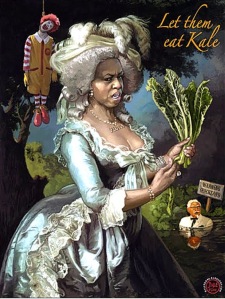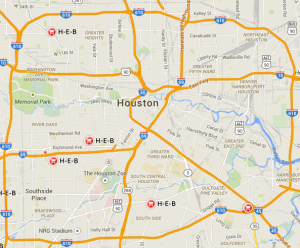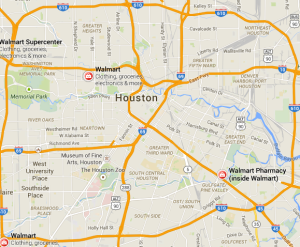People in the United States really have skewed priorities – especially as the nation that prides itself on being the land of the free. More people are not free in the “land of the free” than anywhere else in the world.
Tonight I made one of my half-dozen-or-so annual visits to Subway. When I ordered my turkey and ham sandwich, the employee making my sandwich asked the manager which meat turkey was. I was shocked and surprised. Did she really not know what turkey was? This ultimately resulted in me wondering if maybe she grew up in a family where turkey was a cost prohibitive luxury. Then, this resulted in a whole bunch of thoughts and questions.
Food is expensive. Healthy food is especially expensive. This applies to meals at restaurants or made at home. Many people in our nation cannot afford to eat, or they can only afford fast-food meals. (And not being able to afford to eat to survive is a problem created and perpetuated by the status quo.) The McDonald’s and Wendy’s $1 Menu has only furthered the classism (and racism) of eating. People are always very sensitive when discussing food, diet, and health, but we cannot ignore that people who are overweight or who have related heath problems may not have the luxury of eating anything else. (Additionally, people who are overweight could be facing a variety of other health problems.) Good health is also a bit classist. People, namely those selfishly wealthy resist any national discussion related to giving people access to eating healthier. This very offensive meme addresses some of these issues. While there may be some tiny truth to Michelle Obama being out of touch some in her calls for school lunches to be healthier, this is an important conversation. More often than anyone would like to acknowledge, lunch and/or breakfast at school, is the only meal many kiddos have in a day.
There is also a problem of food deserts in the United States. A food desert is simply an area without a grocery store and/or ready access to fresh, healthy food. Here is a Google Earth Map that shows the location of Kroger grocery stories in Houston, Texas. Notice there are none near the University of Houston / Texas Southern University area – the triangle shaped area toward the bottom of the loop. 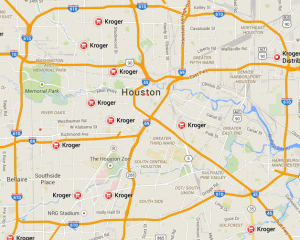 Map of HEB stores follows below. The one store in the UH/TSU area is south of Old Spanish Trail – the “safe(r)” area.
Map of HEB stores follows below. The one store in the UH/TSU area is south of Old Spanish Trail – the “safe(r)” area.
Location of Walmart stores:
Location of Randalls:
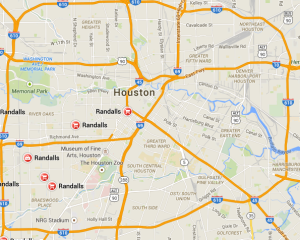 Basically, the area around UH is a food desert. People can’t walk to a grocery store and buy healthy, fresh food and in many cases, can’t drive either. This affects students who live on campus at UH and especially those around the campus, who are often impoverished by society. Those living around the campus receive an average income of roughly $15,000 per year, per household, according to census data. (Of course, an underground economy is inevitably at works, too.) This isn’t even enough to buy food, if fresh, healthy food were even available.
Basically, the area around UH is a food desert. People can’t walk to a grocery store and buy healthy, fresh food and in many cases, can’t drive either. This affects students who live on campus at UH and especially those around the campus, who are often impoverished by society. Those living around the campus receive an average income of roughly $15,000 per year, per household, according to census data. (Of course, an underground economy is inevitably at works, too.) This isn’t even enough to buy food, if fresh, healthy food were even available.
These problems in Houston have received some attention in local news media (see here, here, here, and here) and have improved some, but we really need to pause and consider the consequences of having food deserts in so, so many places across the United States. This hurts every one. It’s almost like most of the United States is a “third world nation” with people starving and stuck. In Freeport, Texas, there is one grocery store. I don’t know how many, but the number without transportation and located more than a half-mile from this store is high. This one grocery store is independently owned and thus, has to charge higher prices to survive. This further perpetuates the consequences of food deserts. Big businesses–the Walmarts, HEBs–locate stores where they can make lots and lots of money at the expense of starving people and does so by starving people. Everything revolving around money is so very problematic.
In these food deserts, there is no absence of Subways, McDonald’s, and similar places – often having locations no more than one or two blocks apart. Food served at these places is not healthy, and there are legitimate questions about them even actually having food.
We need to consider the classism and racism of eating and of being able to eat healthy. We need to consider the morality of debating and debating and debating and not actually doing anything meaningful in terms of having a higher minimum wage – even the morality of making profit off of food and charging so much for it. We must recognize that a heathy meal of grilled chicken and fruit–whether at a restaurant or at home–costs more than a hamburger and fries–is nothing more than a social construction and a very significant indicator of true cultural values.
Just like people have a human right to health care, people have a human right to eat – and we should recognize and honor that act through tangible actions.
In the short story, “The Ones Who Walk Away From Omelas” a child kept locked up in utter poverty is what allows everyone else to live comfortably. Next time you eat a healthy meal, think of all those missing out. Hunger strikes are not going to do any good. Go ahead and still eat what you want, healthy as you can, but remember that poverty and starvation are not limited to poor, strange countries far away, they are in our backyards, and we’re only a step away from being there ourselves.
 See also: PBJ Sandwiches, Racism, and Hidden Power of Words Series, #4
See also: PBJ Sandwiches, Racism, and Hidden Power of Words Series, #4
(Update 12/16: See “Interactive: Do you live in one of Houston’s many food deserts?“)
